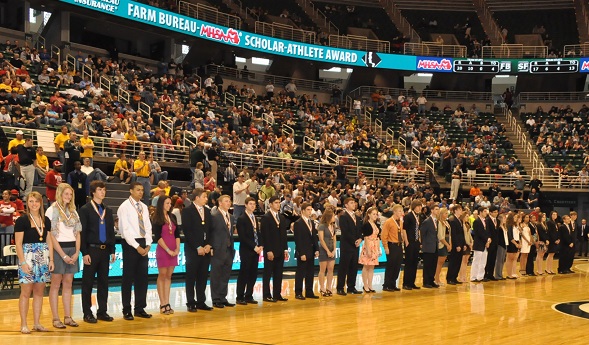
Student Leadership Plays Vital Role
By
Rob Kaminski
MHSAA benchmarks editor
September 26, 2014
By Rob Kaminski
MHSAA benchmarks editor
Fred Smith had a plan. Josh Money had no idea what it was, only that he was to report to the Buchanan High School athletic director’s office in the morning.
In the fall of 2012, Smith was observing a student section of somewhere between a dozen and 20 kids during a volleyball game. At times the line between rooting for his school was crossed into the area of rooting against the opponents; nothing unruly, but not the behavior Smith would prefer to see in his gym.
“I asked one of the students, Josh Money, to come see me the next day,” Smith recalls. “I said, ‘You’re not in trouble. I just want to meet with you about something.’”
Smith prepped for the meeting by queuing up the MHSAA Battle of the Fans video from the previous winter, in which Frankenmuth prevailed in a contest to reward the state’s most innovative and entertaining student rooting section, that above all else did so with the highest degree of sportsmanship on display.
“I asked Josh, ‘Why can’t we do this?’” Smith recalled.
The meeting supplied the impetus for a full-court press to turn around the culture at the small school in southwestern Michigan. By the time the 2013 Battle of the Fans contest was underway just a few short months later, Money was one of the leaders of the section that would become the competition’s next winner.
“I was fortunate. You know the old saying, ‘You can lead a horse to water, but you can’t make them drink?’ Well, I led them to the water, and they drank,” Smith said.
The Buchanan story is just one of many in which solid student leadership can assist not only an athletic program, but also boost the morale of a school and its community.
The first stop on trek to the oasis was to one of the MHSAA’s Sportsmanship Summits, this one in Kalamazoo, where eight students gleaned valuable insight to creating positive, enthusiastic settings at their athletic events.
Instrumental in guiding the students was student council advisor and social studies teacher Stacey Carlin, along with fellow staff members Rachel Carlson, Jessica Cornelius and Lisa Holok.
“It takes a dedicated staff to get behind the effort,” Smith said, pointing out that principal Sharon Steinke allowed the student council to hold school-wide “prep rallies” to allow “The Herd’s” leaders to practice routines and give classmates instructions.
“We have good student leaders and a good teaching staff involved to lead the way, and now it’s become a culture; it’s a culture change,” Smith said. “We have sections for the middle schools and elementary schools at the games, and we are proud to include these kids because that’s where we leave our legacy. We include all grade levels.”
At the root of school sports lies the most precious commodity: students. Involving them in decision-making processes and thrusting them into supervised leadership roles can strengthen the health of the overall program.
In recent years, the MHSAA has put increased emphasis on the promotion of such peer-to-peer educational gatherings.
“Throughout its history, the MHSAA has done a tremendous job working directly with coaches, administrators and officials to make school sports a valuable part of the high school student experience,” said Andy Frushour, director of brand management, who also coordinates student programs for the Association. “While students have always benefitted from those efforts, there were few initiatives involving student-athletes directly.”
That has changed over the last decade.
While the MHSAA Scholar-Athlete program just last year enjoyed its 25th anniversary, and the Women In Sports Leadership Conference has long led the nation in its realm, the MHSAA has introduced several student-based programs recently with the expectation that each will be just as successful as those endeavors.
Eight years ago, the MHSAA formed a 16-member Student Advisory Council, which meets several times annually with MHSAA staff, and serves as a student sounding board for the MHSAA’s Representative Council.
The group also assists in the planning of MHSAA Sportsmanship Summits (held regionally every other year) and Captains Clinics which take place annually in six to 12 locations in Michigan.
“All of these student-training programs, delivered directly to students, make up the overall MHSAA student leadership program,” Frushour said. “To have the voices of our students heard is invaluable in the development of targeted plans for the growth and preservation of school sports. Having students deliver our message to their classmates only helps to strengthen our product.”
Pete Ryan, athletic director for Saginaw Township Community Schools, is involved with two Captains Clinics for the Saginaw Valley Association each year, and understands the importance of student-led messages.
“Peer leadership works well when it is leadership and guidance, and not simply telling others how they have to do it,” Ryan said. “Setting the example is a priority, and exemplifying behaviors that correspond to leadership plays a role.”
The Captains Clinics are geared to accommodate 100-150 students per session, and the benefits can be felt conference-wide.
“Our main goal is to learn and understand that all team members can affect the focus of ‘team’ in many different ways. We ask our students who have attended the Captains Clinics to take back one or two things and re-teach their teammates,” said Jim Conway, Mount Pleasant High School athletic director and an active leader in the annual series.
“Peer learning is wonderful when taught using positive measures. Set examples, be early, respect all teammates, take care of yourself off the field. Also, there is strength in numbers. Student-to-student clearly out-numbers coach-to-student ratio.”
Ryan has noticed a change in environment during contests with some traditional rivals, adding that social media can play a productive role today.
“The Captains Clinics have helped break down barriers between rival schools because there is name and face recognition now,” he says. “We have tried to use social media in a positive manner to invite schools for a tailgate or to create a friendly competition. It can become a negative tool when taunting comes into play. The Captains Clinics provide a great forum to educate our leaders about using social media in a constructive manner.”
“Constructive” is the key word. Properly supervised, social media can be a big help in getting positive messages out.
 “Continued education toward social media is at the forefront of what we need to be discussing,” Conway said. “As the high school climate grows, students must understand how powerful social media has become. Captains Clinics teach that no reaction is the only reaction.”
“Continued education toward social media is at the forefront of what we need to be discussing,” Conway said. “As the high school climate grows, students must understand how powerful social media has become. Captains Clinics teach that no reaction is the only reaction.”
The SAC is using technology to roll out an online Captains Course in the coming months, modifying the printed publication Captains 101 which was published by members of the 2009, 2010 and 2011 Councils.
Under the guidance of Frushour, with current SAC members Connor Thomas (Marlette) and Caycee Turczyn (Lapeer) leading the charge, the new format will prove a valuable resource for captains statewide.
As one would expect, having been selected following a thorough process which includes recommendations, minimum GPAs, and a Q & A form, SAC members are enthusiastic, and they revel in their opportunity to make a difference through communication with MHSAA staff and participation in the summits and clinics.
One of the many benefits is bringing students from diverse backgrounds and large and small communities together.
“I love sports and anything to do with sports,” said Jonathan Perry, SAC member from McBain Northern Michigan Christian. “I hopefully will make my career in sports, for example as an athletic director, and I thought this would be a great learning step. I also wanted to experience high school sports from a different perspective, because I only have a small-school perspective. It’s fun learning about all different school sizes, areas and sports that other SAC members participate in.”
Eliza Beird is also from a small school, Holland Black River. For her, the SAC appointment provided more than the opportunity to play a sport.
“I wanted to do something more with sports besides just participating,” she said. “I was motivated to apply for the SAC because I knew that it would give me an opportunity to expand the role that sports played in my life. Not only would I learn more about the rules and regulations of high school sports, but I would also get the chance to share other’s ideas and visions about high school athletics – along with my own – with the entire state.”
The ability to share ideas with local groups and spread them statewide is one of the foundations on which school sports is built, particularly in Michigan. The MHSAA preaches local leadership and local competition. When the proper messages and behaviors are cultivated in towns, cities and communities around the state, then statewide missions can be achieved.
Today’s students are impacting the culture more than ever simply because communication lines are more open than ever. More two-way streets are in place to provide opportunities for student input, with Captains Clinics and Sportsmanship Summits chief among those avenues.
“Training is priority one,” says Ryan. “We need more time to teach them the value in leadership and then we need more opportunities to do it. The Captains Clinics are great resources for training. There is a need for these clinics, and I would like to see more available.”
Student role models can be pivotal not only on athletic teams, but in classrooms and hallways.
“I’ve found that being a teenager in high school is tough. It’s every girl’s dream to be in the ‘popular group,’ and when you’re not, it makes those four years even harder,” says SAC member Emily Starck of Remus Chippewa Hills. “When it comes to being a leader, it isn’t necessarily about having the title of captain on your team, being president of student council or the latest trendsetter. It’s more about leading by example, and obeying the simple concept of treating others the way you want to be treated, whether that is helping an opponent up on the court or making a conscious effort to smile and say hello to everyone you see in the halls.”
It’s that type of behavior and those types of students which make the job as a high school administrator, teacher and coach so rewarding. Not to mention, it can make the job easier.
“Student leadership benefits the coaches because they can rely on those students to assist with team issues,” said Ryan. “It helps from an administrative standpoint because you know those leaders are buying into the program and will encourage others to do the same. I’ve also seen students set the tone by speaking at parent meetings. They can have a real impact on explaining expectations of the team and school to parents.”
Ah, the parent component. School sports are quite different in nature and purpose from community-based programs, which range from all-star travel teams to recreation leagues run by groups of parents. In most cases, winning and playing time supersede all other goals.
Educational, interscholastic athletics differ. Allowing students to help carry the mission only makes sense. MHSAA Sportsmanship Summits offer a major delivery vehicle.
In the instance relayed from Buchanan at the outset of this article, the Summits can make all the difference. SAC members are heavily involved and interested in the potential of this fall’s sportsmanship efforts.
“My goals for the Sportsmanship Summits this year is to get all of the students in my session to open up and talk about what is good, and bad, sportsmanship,” said Thomas. “Also, I hope to gain personal knowledge, as well as having the other students gain knowledge, that we can bring to our own schools.”
Each Summit has approximately 250 participants who are led through a series of breakout sessions designed to get students talking about sportsmanship in their communities, as well as coming up with solutions to curb bad sportsmanship at school. One of the breakouts is developed and delivered by SAC members. A final session focuses on creating a school sportsmanship action plan.
“I hope we get kids to think more about sportsmanship at the Summits,” Perry said. “Get them thinking more about sportsmanship and letting them figure some of it out on their own, and cause them to talk about it with others. If a person at a Summit talks to five other people who were not at the Summit, we still affect six people. We can have a huge impact on people’s perspective of sportsmanship.”
It’s that “pay it forward” method that bodes well for future grades across the state in general, and perhaps even within the SAC more specifically.
“I hope that other student-athletes are inspired,” added Beird. “I hope we can help motivate them to go and make a change in their school. I also think it would be pretty cool if someone wanted to apply for the SAC after attending one of the Summits.”
The MHSAA is proud of its recent boom in student programming, and plans for the future include greater student content in the highly successful Coaches Advancement Program, and possibly a statewide Captains Summer Camp, potentially drawing 200-300 students to one of Michigan’s picturesque lakeside settings.
Of course, a little outside assistance is always welcome, especially when the helping hand has the same goals in mind. Enter the Michigan State University Institute for the Study of Youth Sports (ISYS). The group helps to facilitate the MHSAA Captains Clinics, and SAC members also participate in a yearly focus group about the state of high schools sports for the ISYS.
ISYS staff member Scott Westfall works diligently with Frushour at the MHSAA in creating a comprehensive program for captains.
“Adults often say and do the right things, thus, their leadership is often viewed as obligatory behavior,” Wesftall said. “However, student-led leadership is much more influential. This power is rooted in the peer-to peer relationships and mutual empathy. Student-athletes are often very close in age, so that leadership is often held with higher validity because the student leader is most likely experiencing many of the same adversities and temptations as the peers on his or her team.”
That’s not just clinician-speak. Several SAC members are living those situations each day and relate similar scenarios.
 “In the hallway and on the field, students will see and be directly influenced by peers around them. Other students may be more likely to copy the actions of those in student leadership,” said Beird. “Because these actions are not being suggested by an authoritative figure, students are less likely to resist these ways and more likely to repeat them. Their peers are leading the way.”
“In the hallway and on the field, students will see and be directly influenced by peers around them. Other students may be more likely to copy the actions of those in student leadership,” said Beird. “Because these actions are not being suggested by an authoritative figure, students are less likely to resist these ways and more likely to repeat them. Their peers are leading the way.”
“Whether its student council or pep club, working with other leaders teaches one to step out of their comfort zone in order to get tasks accomplished,” said Turczyn. “For example, the SAC has taught me to voice my opinions while also taking into consideration the opinions of others, whether we are in agreement or not.”
There are also instances when a school’s best leaders are roaming the grounds and nobody– not even themselves – realize the potential within them. Such was the case for Karen Leinaar, when lightning struck at two different schools.
Leinaar, current Bear Lake and former Benzie Central athletic director, recalls the stories of Travis Clous (Benzie, 2012) and Emileigh Ferguson (Bear Lake, 2014), a pair of typical high school students who emerged as unexpected leaders through their experiences with the SAC.
“Travis was a kid who you thought was kind of a cut-up or class clown type; there was always that smile on his face,” Leinaar recalled. “But, you could tell there was more to him. He organized a cross country function, and from there would ask questions about my job, about the Representative Council and what it did. He applied for a spot on the SAC, and it completely changed him. He began to understand that your voice can be heard if you back it up with rationale. That young man discovered that he was someone people would listen to.
“Emileigh was a decent student and good athlete,” Leinaar said. “She was taller and bigger than most of her classmates, always in front of the line, but unfortunately sometimes for girls, that’s enough. She was a follower, and didn’t always follow the right people. After serving on the SAC, she was able to make good decisions, she was accountable and had a voice. She tried to show people the right way to do things, and if they didn’t, she stayed the course. She was no longer a follower.”
The two are now enrolled at Hope College, walking testimonials that dedicated student programs provide useful skill sets for those putting on a cap and gown each spring.
Maybe someday they’ll join Andria Baker, a charter SAC member from Constantine in 2007, who teaches and coaches in the St. Joseph school system after a year in Alma where she coached volleyball, basketball and track & field.
“On the SAC, I was able to connect with other students who shared similar beliefs with me, and also those who challenged my way of thinking. Being challenged and having to defend what you feel is important and was a tremendous skill to learn,” Baker said.
College-bound former SAC member Coby Ryan also feels well equipped for the next stage of his life.
“Student leadership in high school prepared me quite well for the next chapter in my life,” Ryan said. “It taught me how to communicate with my peers, and it was vital for me to be able to handle the responsibilities given to me in high school. Learning how to act in pressure situations and think on my feet has helped me in the present.”
In Baker’s case, she finds herself in a familiar setting now as an adult, but her role changes ever so slightly as she attempts to pass on the values that launched her career to current students.
“Leadership is something that never stops. As a student-athlete in high school and college, I shared my leadership through my passion of sports and competition,” Baker explains. “However, I was a unique leader playing-wise because I wasn’t always on the court; I wasn't the best player on the team, but I understood the importance of being a team player and every teammate is valuable and important.
“Transitioning that to my life as a professional has been different because I am now showing the athletes and students I work with how to be the next generation of leaders. I have to not only lead by example, but train them how to behave and act on and off the court. I have had many conversations with athletes about not being afraid of the leadership role. Although it is a big role, it will benefit them for the rest of their lives.”
Leadership can also be contagious. The key is harnessing what’s intrinsically good in people and finding a way to bring it to the surface.
Smith mentioned the cultural change at Buchanan, where staff and students have built on the Battle of the Fans momentum.
“Our cheering sections weren’t always the model, and at times had a reputation as not the most sportsmanlike,” Smith said. “But the Battle of the Fans experience has carried over to other areas of sportsmanship and behavior.”
Last year, Buchanan was named one of the five nicest schools in America by Mean Stinks, for its anti-bullying efforts and “ganging up for good.” Part of the honor included a pizza party, courtesy of the sponsors for the Mean Stinks campaign.
“You ever see 300 pizzas brought in from local pizza place?” Smith asked. “It’s quite a sight.”
So, too, are the images of hundreds of students gathered at Sportsmanship Summits, Captains Clinics, and cheering sections on a nightly basis. The MHSAA invites you to come out and have a look.
PHOTOS: (Top) Honorees are recognized with their Farm Bureau/MHSAA Scholar-Athlete Awards in March at the Breslin Center. (Middle) Attendees posefor a souvenir photo at a recent Women in Sports Leadership conference. (Below) Members of the 2014-15 Student Advisory Council participate in a leadership exercise this summer.
Leadership Opportunities Abound for 2014-15
SCHOLAR-ATHLETE AWARD APPLICATIONS
In 2014-15 we celebrate the 26th anniversary of the Farm Bureau Insurance sponsored MHSAA Scholar-Athlete Award. In 2014-15, 32 $1,000 scholarships will again be awarded from a pool of the best and brightest high school seniors. Eligibility requirements and applications can be found at MHSAA.com on the “Students” page. Applications are due to the MHSAA on Dec. 5.
SPORTSMANSHIP SUMMITS
This fall the MHSAA’s series of Sportsmanship Summits returns with four regional clinics spread across the state. These day-long summits will cover sportsmanship topics from a variety of perspectives, including from the viewpoints of athletes, coaches, officials and administrators. Most importantly, though, the summits will focus on sportsmanship in student cheering sections. School groups will review what makes great student sections tick, and then develop plans on how to make its own student section more loud, organized, positive and fun. This year’s Summits are as follows: Gaylord, Nov. 3; Saginaw, Nov. 5; Grand Rapids, Nov. 10; Warren, Nov. 12.
BATTLE OF THE FANS
The fourth annual MHSAA Battle of the Fans competition will take place again during the winter season. The contest, organized by the MHSAA Student Advisory Council, seeks to find the loudest, most organized, most fun and most positive student cheering section in the state. Students should begin filming their student sections this fall in preparation for the video deadline in early January. Beaverton High School is the defending champion, while Buchanan won in 2012-13 and Frankenmuth in 2011-12. More details are available at http://www.mhsaa.com/BOTF.
STUDENT LEADERSHIP GRANTS
The MHSAA has earmarked $20,000 to help students become better leaders. This fund originated from a gift to the MHSAA from student leadership training leader, the former W.B.A. Ruster Foundation. Scholarships are available to students to attend existing student leadership camps, and schools can receive grant money to create student leadership programs in their communities. Funding is available NOW. There is no deadline – applications are accepted, and money is distributed, year-round. Visit the “Students” page at MHSAA.com.
CAPTAINS CLINICS
The purpose of the MHSAA Captains Clinic series is to give basic leadership training to both current and future team captains. The training session is only four-and-a-half hours long, so there’s no way these students can learn everything they need to become effective team leaders. Instead, we use this time as an opportunity to give the students the basics of being a team captain – we answer the question, “I was named a team captain, now what am I supposed to do?” We walk through the role of a team captain, we discuss common team problems, and we finish the day by making a “To Do” guide for all of each school’s team captains. Several clinics will take place in the coming year, and the MHSAA would love to come to your league. If you can get your entire league on board, guarantee 100-150 participants, and suggest a good location (preferably a school on a professional development day), the MHSAA will do the rest. The Association will coordinate the registration process, negotiate with facilities if necessary, provide the curriculum and supplies, work with the caterers and bring facilitators to the clinic. Contact Andy Frushour to learn more about the Captains clinic program – [email protected].
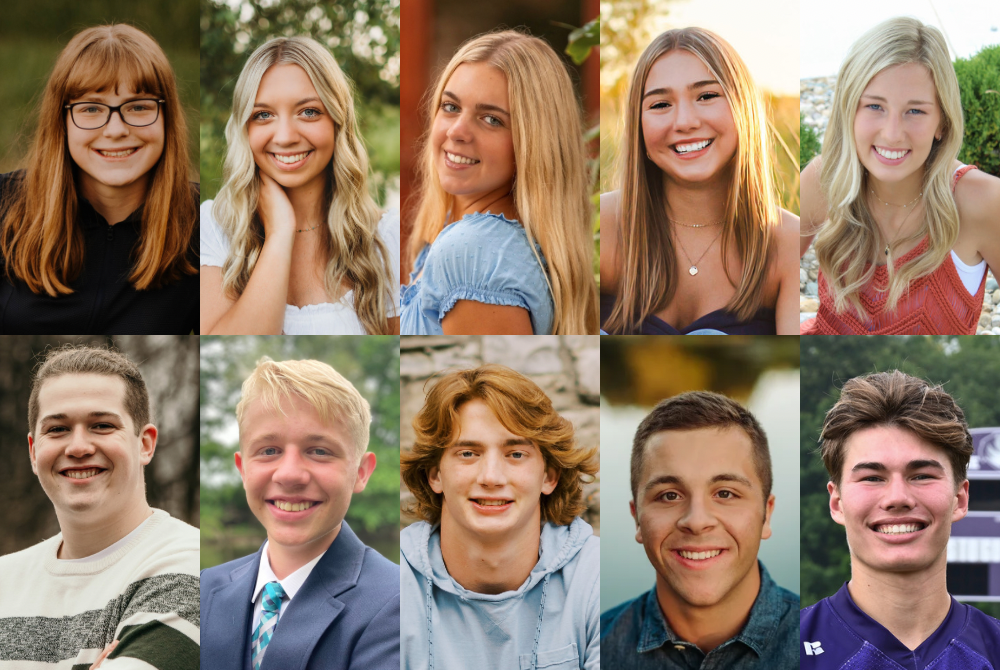
2024 Scholar-Athlete Award Recipients Announced in Class C & D
By
Geoff Kimmerly
MHSAA.com senior editor
February 5, 2024
The Michigan High School Athletic Association has selected 10 student-athletes from Class C and D member schools to receive scholarships through the MHSAA/Farm Bureau Insurance Scholar-Athlete Award program.
 Farm Bureau Insurance, in its 35th year of sponsoring the award, will give $2,000 college scholarships to 32 individuals who represent their member schools in at least one sport in which the Association sponsors a postseason tournament. The first 30 scholarships are awarded proportionately by school classification and the number of student-athletes involved in those classes; also, there are two at-large honorees who can come from any classification.
Farm Bureau Insurance, in its 35th year of sponsoring the award, will give $2,000 college scholarships to 32 individuals who represent their member schools in at least one sport in which the Association sponsors a postseason tournament. The first 30 scholarships are awarded proportionately by school classification and the number of student-athletes involved in those classes; also, there are two at-large honorees who can come from any classification.
Students applying for the Scholar-Athlete Award must be carrying at least a 3.5 (on a 4.0 scale) grade-point average and have previously won a letter in a varsity sport in which the Michigan High School Athletic Association sponsors a postseason tournament. Other requirements for the applicants were to show active participation in other school and community activities and produce an essay on the importance of sportsmanship in educational athletics.
The 32 scholarship recipients will be recognized March 16 during the MHSAA Boys Basketball Finals at the Breslin Student Events Center in East Lansing.
The Class C Scholar-Athlete Award honorees are Sara Dammann, New Lothrop; Kylie Ott, Bridgman; Brooke Spitzley, Pewamo-Westphalia; Tristan B. Harbaugh, Gobles; Benjamin March, St. Louis; and Ryin Ruddy, Ottawa Lake Whiteford.
The Class D Scholar-Athlete Award recipients are Mallory Lowe, Leland; Alivia Salenbien, Britton Deerfield; Ridley Fast, Hillsdale Academy; and Ben McCaw, Lawrence.
Overviews of the scholarship recipients of the Class C Scholar-Athlete Award follow. A quote from each recipient's essay also is included:
 Sara Dammann, New Lothrop
Sara Dammann, New Lothrop
Ran four seasons of cross country and will play her fourth season of varsity softball this spring. Raced at the MHSAA Lower Peninsula Cross Country Finals this past fall and earned all-state honorable mention in softball as a junior. Named National Merit Scholarship semifinalist and earned College Board National Rural and Small Town Award. Participated in Shiawassee Scholars Class of 2024 program throughout high school, and is participating in second year of National Honor Society. Has participated in FFA (Future Farmers of America) throughout high school as well, earning state championships for prepared public speaking and parliamentary procedure and serving as her school chapter’s vice president and also region’s vice president. Participating in third year of quiz bowl and has served as captain multiple years. Served two years on student council and as a youth sports umpire throughout high school, and also participates in church youth group and serves as lector. Is undecided where she will attend college but intends to study something in a business-related field.
Essay Quote: “This lesson on teamwork, learned through educational athletics, is also imperative in life. Sure, individual successes are important, but to make the positive impact the world needs, we … need to work together to use our individual strengths to build a better tomorrow. We need to support one another's talents and focus on overcoming challenges together, as a team.”
 Kylie Ott, Bridgman
Kylie Ott, Bridgman
Played four seasons of varsity volleyball, is playing her second of varsity basketball and will compete in her fourth of track & field this spring. Earned all-conference recognition in track four times and also academic all-state in that sport. Received all-conference honorable mention in volleyball. Served as captain of volleyball and basketball teams. Participating in fourth year of student senate and class advisory, and has served as senate and class president. Participating in second year of National Honor Society and has served as vice president of her chapter, and fourth year of key club and has served president of that organization as well. Participating in fourth year of DECA, and has served as secretary. Will attend Purdue University and study biomedical engineering.
Essay Quote: At first sight of the word ‘sportsmanship,’ you may visualize the act of helping another player up after a fall or encouraging teammates after mistakes. However, true sportsmanship isn’t limited by one public gesture, but rather, a consistent pursuit of little things even when no one is watching. It is a moral behavior that is learned and taught by example and comes not by desire for appraisal but by an adamant passion for the game.”
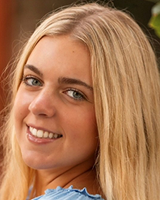 Brooke Spitzley, Pewamo-Westphalia
Brooke Spitzley, Pewamo-Westphalia
Played two seasons of varsity golf, will play third of varsity softball in the spring, and also played three seasons of varsity basketball. Qualified for MHSAA Finals in golf and earned all-area honors multiple seasons in softball. Earned academic all-state honors in golf and basketball. Served as captain of softball and golf teams, and helped found the school’s girls golf program. Participating in second year of National Honor Society, and as chapter president, and serving in first year on student council and as treasurer. Serving as co-editor of yearbook in second year on staff, and as social media manager for multiple student groups. Participating in third years of Student Voice and PLANK student support program, and first as part of P-W Students Take Charge. Will attend University of South Florida and study medical biology.
Essay Quote: “It is hard for athletes to realize that there is more to life than success in a sport; sportsmanship often puts this into perspective. Helping an opponent off the ground, shaking hands, even a meaningful “good job” allows an athlete to take a step back from the competitive nature they are taught and realize the big picture … that there is more to life than the stat book that one’s self-worth is derived from.”
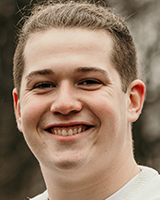 Tristan B. Harbaugh, Gobles
Tristan B. Harbaugh, Gobles
Played three seasons of varsity football, is playing his third of varsity basketball and will play his fourth of varsity baseball this spring. Earned all-league in football and basketball and academic all-state in football and baseball, and was named a Michigan High School Football Coaches Association scholar-athlete. Served as captain of all three high school teams. Participating in third year of National Honor Society and fourth on student leadership team, and playing third year in school marching/concert/jazz band. Serving as first chair for percussion and is a three-time band section leader. Served as youth sports volunteer throughout high school and tutor the last two years. Will attend University of Michigan and study biomedical engineering.
Essay Quote: “… This singular experience opened my eyes to the true meaning of sportsmanship, and how impactful sports could be when the accomplishments of character are discussed, and when sportsmanship is about building people up, teammates, opponents, and even people in the stands who see something special taking place on the field. The values that high school sports teach and the experiences they provide, like teamwork, leadership, and work ethic, can bring out the best in athletes.”
 Ben March, St. Louis
Ben March, St. Louis
Ran four seasons of cross country, is competing in his fourth of varsity wrestling and will compete in his fourth of track & field this spring. Earned all-state all four seasons and twice won Regional championships in cross country, helping that team to Lower Peninsula Division 3 Finals championships in 2020 and 2021. Earned all-league honorable mention twice and won a District title in wrestling, helping that team to two Regional championships, and earned multiple league and regional honors and made all-state as part of a relay in track. Earned academic all-state in cross country and track and has served as captain of cross country and wrestling teams multiple seasons. Participating in third year of Business Professionals of America, and has served as secretary, and is participating in second year of Rotary Interact and has served as treasurer. Earned Rotary Youth Leadership Award and placed third in region for BPA. Will attend Lansing Community College and study business.
Essay Quote: “While the accomplishments of the student-athletes who earned these trophies have long since been forgotten, the virtues of sportsmanship like fairness, integrity, courage, persistence, responsibility, and respect that were gained from participating in high school athletics have been carried with them into adulthood. It gave them the tools needed to positively impact their families and coworkers long after their high school athletic careers were done.”
 Ryin Ruddy, Ottawa Lake Whiteford
Ryin Ruddy, Ottawa Lake Whiteford
Played four seasons of varsity football, is playing his third of varsity basketball, will play his fourth of varsity baseball in the spring and compete in second of track & field as well. Earned all-state in football the last two seasons and helped Whiteford to 2022 Division 8 title. Earned all-state in track in four events. Earned academic all-state in football and track also league scholar athlete honors in all four sports, and was named National Football Foundation scholar athlete. Served as football team captain. Serving fourth year on student council and participating in second year of National Honor Society. Has participated throughout high school in FFA (Future Farmers of America) and Compelled Youth, and also will participate in spring musical for fourth time. Will attend Hillsdale College and study biochemistry.
Essay Quote: “Sportsmanship is about exercising self-control. This includes curbing emotions, controlling one’s tongue, and keeping negative body language in check. Sportsmanship is obviously about saying ‘good game,’ but it is also about respecting yourself, regimenting your life, and having the self-discipline to put yourself into a position to succeed in everything you do. Even when a loss is inevitable, great sportsmanship is about being genuinely happy when someone else succeeds, looking a competitor in the eye and congratulating them on a job well done.”
Other Class C girls finalists for the Scholar-Athlete Award were Mikaela Ann Boyle, Bad Axe; Allison Bowles, Clinton; Jaida Schulte, Elk Rapids; Lauren Borsenik, Hemlock; Mariah Thompson, Houghton Lake; Lola Korpi, Ishpeming; Alexis Ewing, Jonesville; Adilyn Anne Ruggles, Marlette; and Claire Neumann, Saginaw Valley Lutheran.
Other Class C boys finalists for the Scholar-Athlete Award were Carter Upper, Alcona; Payton Butkovich, Beal City; Jamisen Latham, Beal City; Niko Burgoon, Iron Mountain; Kannon Duffing, Manchester; Brad H. McNeill, Montrose; Jack Lantz, New Buffalo; Julian Ahluwalia, Traverse City St. Francis; and Landen Muska, Vassar.
Overviews of the scholarship recipients of the Class D Scholar-Athlete Award follow. A quote from each recipient's essay also is included:
 Mallory Lowe, Leland
Mallory Lowe, Leland
Played three seasons of varsity volleyball, is playing her third of varsity basketball and will play her fourth of varsity soccer this spring. Helped volleyball team to Division 4 runner-up finish this past fall, making the all-state third team and earning all-state academic recognition. Earned all-conference honorable mention in basketball and helped soccer team to Northwest Conference co-championship in 2023. Also part of academic all-state basketball teams the last two seasons. Serving as captain of all three teams as a senior and also was basketball captain as a junior. Earned AP Scholar recognition and completed International Baccalaureate Middle Years Programme. Carries a 3.99 grade-point average and is participating in third years of National Honor Society and National Art Honor Society, including as president of school’s NAHS. Participating in fourth years of student council and Grand Traverse Regional Community Foundation Youth Advisory Council, with leadership positions in both. Served as volunteer volleyball and basketball coach throughout high school and mentor for student with Type 1 diabetes. Will attend University of Michigan but is undecided on her field of study.
Essay Quote: “We have learned valuable lessons including teamwork, effort, grace, dignity and fair play that will leave a lasting impression on our character, guiding us not only in athletics but also in life. This powerful connection reminds us that how we play and how we treat our fellow athletes matters so much more than the final score.”
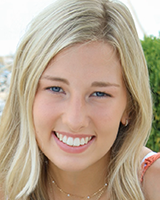 Alivia Salenbien, Britton Deerfield
Alivia Salenbien, Britton Deerfield
Played three seasons of varsity volleyball, is playing her fourth of varsity basketball and will compete in her fourth of track & field this spring; also played on the boys varsity golf team as a junior. Earned all-county honorable mention for basketball as a junior and is a five-time Regional medalist in track & field. Earned scholar-athlete honors in multiple sports and served as captain for volleyball and basketball teams. Participating in third year of National Honor Society, serving as chapter president, and third year of student government serving as class vice president. Participated in American Legion Girls State and earned girls nation runner-up finish. Teaching church elementary catechism class for third year. Is undecided where she will attend college but intends to study early childhood education.
Essay Quote: “Balancing school, home life, and sports are difficult tasks. However, growing up in that scene, I thought that doing all these activities was the only way to a successful life. … But now, as a senior in high school looking back at my time at Britton Deerfield, I realize this could not be farther from the truth. Nobody judged whether I was good at the sports I played or not. Nobody judged whether I was at the top of the class or the bottom. Nobody judged how well I could balance my life. What people will remember about me when I leave high school is my sportsmanship.”
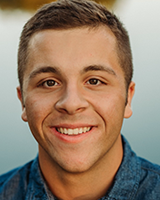 Ridley Fast, Hillsdale Academy
Ridley Fast, Hillsdale Academy
Played four seasons of varsity soccer, is playing his third of varsity basketball and will play his fourth of varsity golf this spring; also competed in track & field as a freshman. Made all-state second team for soccer in the fall and helped team to four District championships. Earned all-area in basketball and helped that team to two league and two District titles, and made all-state first team in golf as a junior in helping that team to league and Regional titles. Earned all-region as Hillsdale Academy won 2021 Michigan Interscholastic Track Coaches Association team state championship. Earned academic all-state recognition in soccer and golf. Served as co-captain for soccer, basketball and golf. Participating in fourth years of student council, service club and drama club and second of National Honor Society, and is dually enrolled at Hillsdale College. Also participates in finance club and concert choir. Has served as student council vice president and league’s leadership conference representative. Will attend Trine University and study business and engineering.
Essay Quote: “I have played with my fair share of cheating opponents, but I am proud to say that I have never cheated, for I know I could not live with myself if I ever tried to do it. Cheating is caring more about results than the process, and the point of sports is to savor and endure the process and struggle. … Sportsmanship is the whole idea of competition itself; the concept of giving your best to see who comes out on top.”
 Ben McCaw, Lawrence
Ben McCaw, Lawrence
Played four seasons of varsity football, is playing his second of varsity basketball, will play his third of varsity baseball this spring and also will return for his third of track & field. Earned first-team all-league and academic all-state recognition in football this past fall, second team all-league and all-academic with his basketball team as a junior, and selected for the all-state second team in baseball last spring. Serving as varsity team captain for the second season for all three sports. Earned College Board National Rural and Small Town Award and dually enrolled at Kalamazoo Valley Community College. Serving as student council secretary after serving as class president three years, and participating in third years of National Honor Society and pep club. Volunteered throughout high school with local youth basketball, baseball and softball programs. Is undecided where he will attend college but intends to study marketing.
Essay Quote: “Sportsmanship is important; however, it cannot be forced – it must be chosen. It is encouraged by the MHSAA at every coin toss meeting between captains, but there are few rules that prevent poor sportsmanship. This is a good thing, sportsmanship should be a choice; otherwise, it does not properly demonstrate our character. Our sportsmanship reflects who we are: on the field, in the classroom, and in life.”
Other Class D girls finalists for the Scholar-Athlete Award were Makenzee Grimm, Battle Creek St. Philip; Alayna Salenbien, Britton Deerfield; Caroline Beggs, Clarkston Everest Collegiate; Rachel Case, Kimball New Life Christian; Bonnie Kiger, Marion; and Hazel Hysell, St. Joseph Our Lady of the Lake Catholic.
Other Class D boys finalists for the Scholar-Athlete Award were Samuel Wallace Lutz, Adrian Lenawee Christian; Jürgen Griswold, Ellsworth; Christian Besonen, Ewen-Trout Creek; Trenton Taratuta, Hillman; Nathan Mihills, Marcellus; and Clayton Shoup, Mason County Eastern.
The Class B scholarship award recipients will be announced Feb. 13, and the Class A honorees will be announced Feb. 20.
Farm Bureau Insurance of Michigan was founded in 1949 by Michigan farmers who wanted an insurance company that worked as hard as they did. Those values still guide the company today and are a big reason why it is known as Michigan’s Insurance Company, dedicated to protecting the farms, families, and businesses of this great state. Farm Bureau Insurance agents across Michigan provide a full range of insurance services — life, home, auto, farm, business, retirement, Lake Estate®, and more — protecting nearly 500,000 Michigan policyholders.
The MHSAA is a private, not-for-profit corporation of voluntary membership by more than 1,500 public and private senior high schools and junior high/middle schools which exists to develop common rules for athletic eligibility and competition. No government funds or tax dollars support the MHSAA, which was the first such association nationally to not accept membership dues or tournament entry fees from schools. Member schools which enforce these rules are permitted to participate in MHSAA tournaments, which attract more than 1.4 million spectators each year.

